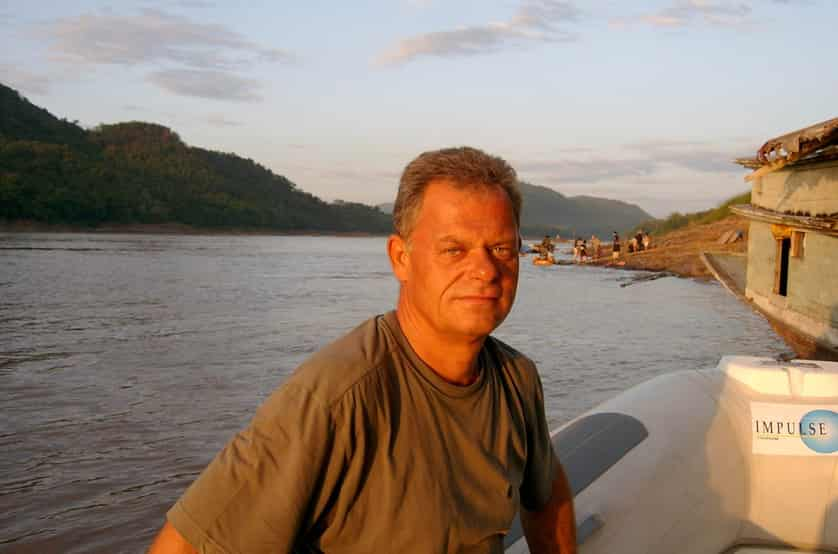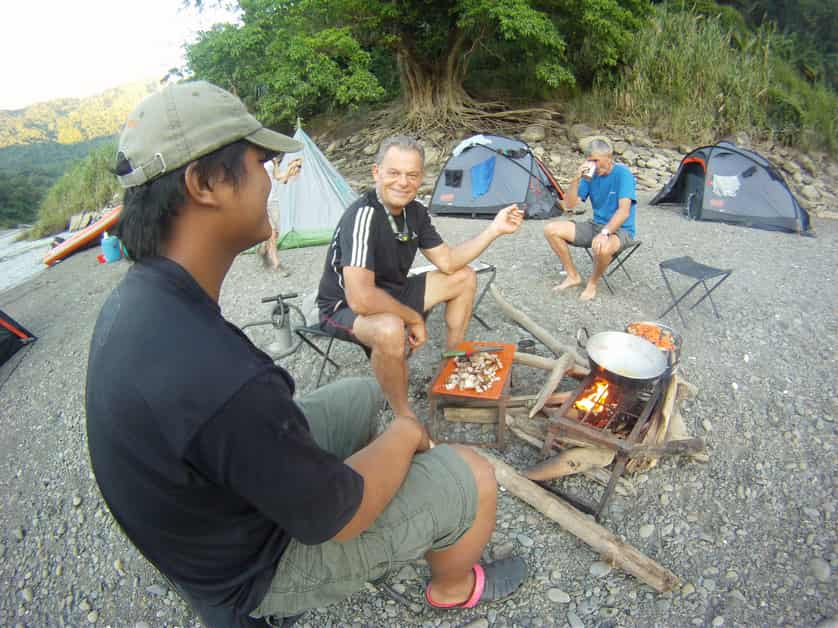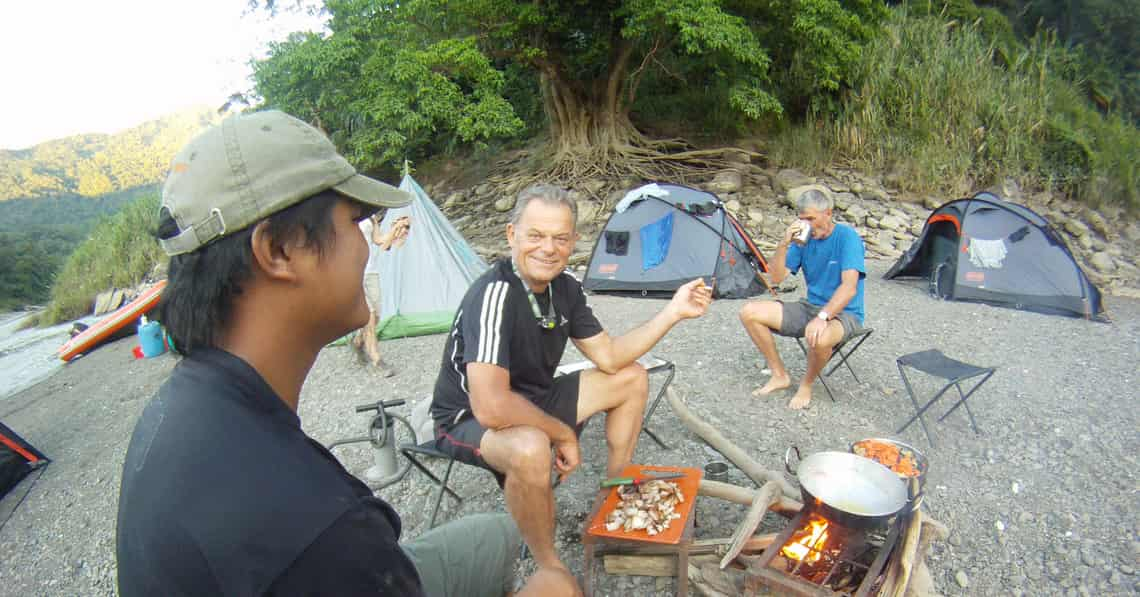Arin Chokphisit proudly shows me his Thai ID card, telling me that a monk had chosen his name for him after studying his horoscope, as is the Thai way. Arin is a member of an exclusive and minute group of foreigners who have gained Thai citizenship, in his case largely due to the impact he has had on the Thai tourism industry.
Arin mostly stays in the wallet, however, only to be brought out at government checkpoints or dinner parties. The man himself, Armin Schoch, is a familiar face in the Chiang Mai expat scene, having lived here since 2003, and is also recognised as a giant in the Thai and regional tourism industry, which he has been a pioneer of since the early eighties.

Mekong River Expedition, 2005
“I had been selling tickets in a travel agency at home in Switzerland after completion of my apprenticeship with Swissair,” said Armin of his early career, “but all I wanted was to find a job abroad so when I saw an ad for Diethelm Travel, part of the then Diethelm & Co. Ltd. trading company established in Thailand in 1906 and the largest travel company in the country, I decided to apply. They were looking for a mature executive to manage 30 staff but I managed to convince them that even with my lack of experience I could do the job. So in 1983, at the age of 25, I married my then-girlfriend Anne and we arrived in Bangkok in the middle of a massive flood,” Armin began his story as we sat down for a long lunch of craft beers and pasta at a restaurant near Citylife.
“Tourism in Thailand in those days was just on the cusp of a massive boom,” explained Armin, a man with a gruff voice, a face weathered with experience and an infectious enthusiasm for life. “You were looking at absolute growth; whatever we tried would work. It was all about Bangkok, Pattaya and Hua Hin then, it was only later that Samui, Phuket and Chiang Mai emerged. I remembered trying to drive along the coast to Karon from Patong Beach in Phuket once and we couldn’t make it, there weren’t even dirt tracks! We had one office in Bangkok for the entire country. The focus of that first decade was on increasing infrastructure; so, offering advice to the government as to what tourists were looking for, training personnel and exploring new attractions and routes. These were the days when tours would be booked by air mail, up to a year in advance. But the tourism was very two dimensional, with set packages that didn’t offer much variety in terms of special interests or cater to specific groups; there were always the classic round trips which everyone did. This routine also became a problem in attracting return visitors.”
The late ‘80s also saw Laos, Cambodia and Vietnam liberalise their investment laws. Having seen, with certain envy, the growth of Thailand’s tourism industry, Indochina began to tentatively explore their own potentials. “By ’89-’90 those countries had started embracing capitalism and I was tasked with going to Laos to establish the very first joint venture tourism company, something we eventually successfully did in all three countries. While these countries were very aware of the undesirable aspects of Thailand’s tourism and tried their best not to copy them, capitalism brought the same types of corruption and haphazard development you have seen in Thailand. They learned from Thailand but were still unable to correct its mistakes,” said Armin, shaking his head.
While Thailand was beginning to add other dimensions to its tourism – motorbike tours, tented camps, eco-tourism, health retreats – Indochina remained two-dimensional with its own well-trodden routes and circuits. “It was always the same cities, same attractions, same hotels, indoctrinated guides who couldn’t really say what they felt, it wasn’t until much later that they even discovered the beaches in these countries,” added Armin. “It would take many years before you could visit hill tribe villages, go on a cycling tour or go on a sea canoe.”
“I like pushing borders, going further, deeper,” continued Armin, a bon vivant and an avid biker who has spent over 30 years exploring, and eventually opening up, some of the most remote areas in the region. Armin has led and still enjoys leading numerous motorbike tours in Thailand and Myanmar. In the early 2000s he also led two groundbreaking boat trips along the entire navigable length of the Mekong with one and the same boat, the first of which was a hovercraft which he took from Jinghong, China to Saigon, Vietnam and back, making headlines across the region and beyond.
After a decade working in Thailand and Indochina, Armin began to become fascinated by Myanmar, a country then relatively unexplored. In 1994 he decided to leave Diethelm Travel and try his luck in Myanmar.
“I arrived there knowing no one. I kept a low profile, stayed in a guesthouse and just listened and learned, figuring out who the movers and shakers were, eventually identifying who to approach for a joint venture,” he continued. “You will be surprised to hear that in all my years I never had to bribe anyone. You just have to talk sense. And so it was that I arrived just as many other players began to set up shop such as ‘Road to Mandalay’ and Air Mandalay. We were the handling agent for the cr่me de la cr่me of international travel agencies. It was a great time, meeting celebrities and enjoying soirees with the most interesting people in the country. There were so few foreigners in Yangon then that if you saw one, you would likely cross the street to find out who they were, ask them what they were doing, then invite them to dinner. My company, Insight Myanmar, became successful within a short time and in 1997 we opened L’Opera Restaurant in Yangon as our second restaurant joint venture after we had opened the very first Italian restaurant in Laos with L’Opera in 1992. As we did earlier in Indochina, I found myself advising the government as to how to go forward regarding facilities for visas, how we pay tax and other tourism-related issues. The main challenge was the inability to function efficiently as many laws and government procedures in use dated back to colonial times. But these were glorious days. My wife Anne set up a trading business importing Tissot and Rado watches and we lived in a sumptuous colonial-era house, spending our days working, our evenings entertaining and our spare time exploring the country.”
On one such trip up north in the Kachin State, Armin heard about and eventually met a British man of German ancestry who was living in a compound with his 12 children and 30 grandchildren. They were completely self-sufficient, except for the occasional need of money to buy salt. He had grown up in Darjeeling, and was lying on a hill waiting to ambush Japanese troops one day during the Second World War, when three hill tribe women walked past. He promptly fell in love with one of them and followed her back to her village to ask her father for her hand. When Armin returned to Yangon and told the British embassy they had a British subject living in the far north of the country, they were shocked to hear of him. “Friends and I bought him an old car as he was getting old and it was getting hard to take his tulips to the market to trade for salt. He told me that the last time he had been to Yangon was in 1929!” regaled Armin who has an encyclopedia-worth of such stories.

camp cook, Kaladan River, northwest Burma, 2012
Doing business in Myanmar in the ‘90s was not easy. “Myanmar was a rumor mill and businessmen lacked reliable information on what was going on inside the country. As a consequence, you basically had a business horizon of only six months, which made any planning very difficult. To find out what was going on in Myanmar you had to fly to Bangkok to clear your head for a few days and then talk to people in Bangkok about it. No one in Myanmar really had a clue what was going on. Then the Asian currency crisis occurred and coincided with turbulent time in Myanmar politics and I decided to set up Insight Thailand and Insight Cambodia to diversify my risks and in 2000 ended up selling my companies to Diethelm and returning to my alma mater as the Group Managing Director of Diethelm Travel.” He and Anne sold their businesses and headed back to Bangkok. The next few years saw massive mergers and acquisitions within the Diethelm empire, and in 2003 Armin decided to go solo again, this time choosing Chiang Mai to set up shop.
“Like many people, I had nowhere else to go and that’s how I ended up in Chiang Mai,” he grinned, before taking a minute to polish off the rest of his pasta. In Chiang Mai, he set up a new company, Impulse Tourism, which today provides high-end and specialised tours to northern Thailand and the region. He still maintains close ties with Diethelm Travel as someone who possesses intimate knowledge of Indochina and Myanmar as well as the history of the company.
Armin appears to be ambivalent about the tourism industry in the region, and Chiang Mai specifically. “Tourism kills,” he said with a dramatic slap of the table, and a resulting slosh of beer. “It kills the environment, it kills culture and it can kill society. But like everyone else, I wasn’t in the least aware of any of this in the ‘80s. We were simply enjoying the growth. There are still beautiful places in the region, but when tourism hits it, it takes years, but eventually you have to wonder whether or not you have regret in being part of that machine. But I have come to realise that you can’t stop tourism. It’s not just big business which creates tourism, the demand comes from all sides and levels, and that is why it is so hard to manage. You can’t just blame tourism, you have to blame the providers and the environment in which the providers are allowed to flourish. If you allow haphazard development to cater to every need, and I mean every vertical and horizontal need, then…well, look at Pattaya.”
Armin believes that he has a role in lessening the impact of tourism and that is something he is growing more and more aware of; training responsible guides, adhering to local culture, showing respect, etc.
“Look at Chiang Mai,” he points out, “Where I think things went wrong is that there are no platforms here to unite all the stakeholders in the industry on a broad level that includes local government to foreign operators. There is not enough exchange and that is when things start getting very confusing.”
He uses elephant tourism as a case in point: “There are, I believe, 44 elephant camps in the north of Thailand, many of which are new. As a Chiang Mai based tour operator serving reputable overseas tour companies who have growing concerns about the elephant tourism industry, it is our duty to ensure that those elephant camps we work with are professional in everything they do, we have to evaluate with them their health and safety procedures, first aid capabilities – an endless list to satisfy legal and socio-political requirements of the European and American tourism industry,” said Armin. “But the problems occur when you try to set standards in an industry which doesn’t even understand the standards. OK, you have an outfit like Mae Sa Elephant Camp which is a 100% pure tourism business, but one which is run very slickly and professionally. Then you get the Lampang Elephant Conservation Centre which is also a hospital and then you have Patara, a breeding centre with a secondary function of tourism. These three places all offer an elephant experience, but they all have completely different objectives. These subtle messages are hard to get across to tourists on the other side of the world. Many people are shying away from big businesses like Mae Sa Elephant Camp as it has never pretended to be anything but a business, and people are distrustful. What they don’t realise is that Mae Sa is much more aware of the polemics involved and know that they can’t afford to have accidents or to mistreat their elephants. When I took a close look at them I was flabbergasted to find out how professionally they rotated their elephants, how systematic their reporting system was and the care they took of their elephants. And just because you call yourself a sanctuary doesn’t mean that you treat elephants any better.”
According to Armin, as of the start of this winter tourist season most European tour operators will no longer sell elephant rides, boycotting many established businesses which provide them. It has become politically incorrect to ride elephants and with the risk of accidents, insurers have also bowed out of the arena. “What this means is that tourists, mainly Asian, who wish to ride elephants will find their own way to camps whose owners are savvy enough to know that words like nature, park, sanctuary, rescue centre or home will attract tourists. These are pure business people who often do not understand, nor frankly care about, the socio-political issues surrounding elephants. Without travel agents, these camps are marketing online, pushing the business away from established businesses with checks and balances into the hands of potentially unscrupulous operators.”
“Elephants have long been a unique selling proposition for northern Thailand,” continued Armin. “I use them as an example, but as rules and regulations become more rigid in the west, established channels will become more cautious, opening up opportunities for the less scrupulous. This could potentially be applied to the entire tourism industry.”
Armin points out that hotels and other local operators are also coming under great scrutiny by European agents. “In some countries like Germany, if someone booked a two week tour to Thailand, for instance,” he explained, “and all was great except for the fact that one day in Phuket they came back from their tour only to find that the pool was closed for repair, they can basically sue the tour operator for not informing them, thus miring their entire holiday experience. A German judge could end up forcing the operator who sold the entire travel package to refund a portion of the entire holiday to the tourist, not just that portion, but a percentage of everything from flights to accommodation. The overseas tour operators’ counterpart agencies here are locked into a far more intricate system unless they choose to sell directly to the customer online…which brings us back to the lack of accountability. But it’s not necessarily bad. Who knows? There is a lot of unknown now. Look at this Chinese wave we are all riding. Will it last? Will it grow? I don’t think anyone knows, but we are certainly changing a lot about ourselves to accommodate what may or may not be a sustainable proposition. We have reached a dimension of proportions when it is no longer a tourism issue, but a social issue, which brings me back to the lack of a platform for stakeholders to discuss these collective concerns.”
Armin and Anne have put their roots down in Chiang Mai and this is their home base from which they travel the region. He continues to hope that the many stakeholders in the tourism industry will communicate more so as to make sure that while Thailand enjoys the tourism income, it doesn’t damage the very things tourists come here to see.
